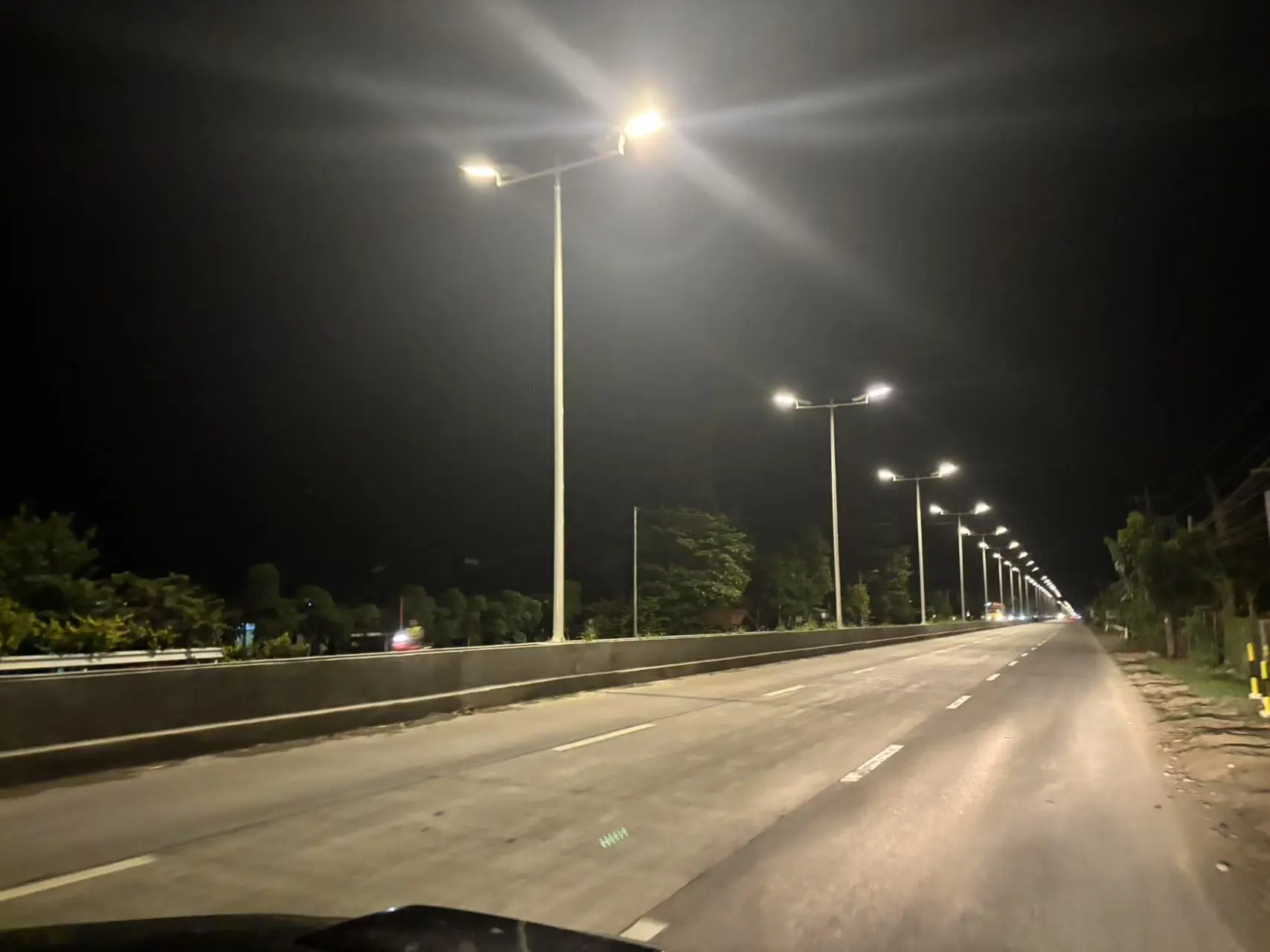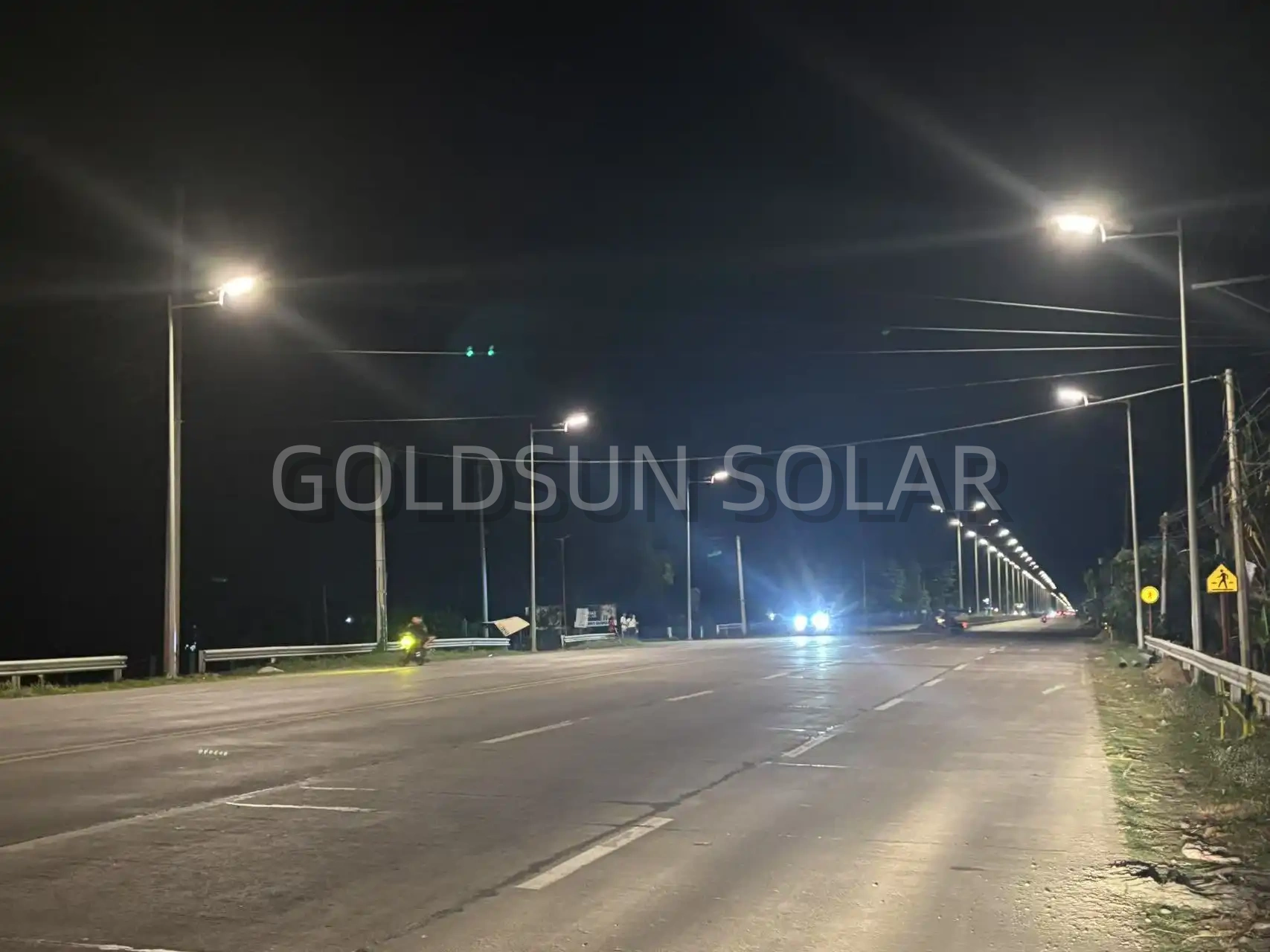Checklists Of 80w Solar Street Light Quality Control
Ensuring the quality of 80w solar street lights is crucial for reliable and efficient outdoor lighting solutions. This comprehensive guide explores the essential checklists for quality control in 80w solar street lights, covering various aspects from component inspection to performance testing. By following these checklists, manufacturers and buyers can ensure that the solar street lights meet the required standards and deliver optimal performance in real-world conditions.

What are the key components to inspect in an 80w solar street light?
Solar Panel Inspection
The solar panel is a critical component of an 80w solar street light, responsible for converting sunlight into electrical energy. When inspecting the solar panel, it's essential to check for any physical damage, such as cracks or scratches, which could significantly reduce its efficiency. Verify that the panel's wattage matches the specified 80w rating and examine the quality of the photovoltaic cells. The panel should be properly sealed to prevent moisture ingress, which can lead to corrosion and reduced performance over time. Additionally, inspect the panel's mounting brackets and ensure they are sturdy enough to withstand various weather conditions. For 80w solar street lights, the panel's orientation and tilt angle should be optimized to maximize sunlight exposure throughout the day.
Battery Quality Check
The battery is another crucial component of an 80w solar street light, storing the energy collected during the day for use at night. When conducting a quality control check on the battery, verify its capacity and type, ensuring it's suitable for the 80w solar street light's power requirements. Lithium-ion batteries are commonly used due to their high energy density and long lifespan. Inspect the battery casing for any signs of damage or leakage, and confirm that it's properly sealed to protect against environmental factors. Test the battery's charge and discharge cycles to ensure it meets the specified performance criteria. For 80w solar street lights, the battery should have sufficient capacity to power the light through the night, even during periods of low sunlight.
LED Light Fixture Examination
The LED light fixture is the component responsible for providing illumination in an 80w solar street light. During the quality control process, inspect the LED chips for any visible defects and verify that the number and arrangement of LEDs match the design specifications. Check the light fixture's IP rating to ensure it provides adequate protection against dust and water ingress. Examine the heat sink and thermal management system, as proper heat dissipation is crucial for maintaining the LED's lifespan and efficiency. For 80w solar street lights, the light distribution pattern should be uniform and appropriate for the intended application. Test the light output and color temperature to confirm they meet the required standards. Additionally, inspect the fixture's housing for durability and resistance to corrosion, as it will be exposed to various environmental conditions.
How to evaluate the performance of an 80w solar street light?
Illumination Testing
Evaluating the illumination performance of an 80w solar street light is crucial to ensure it meets the required lighting standards for its intended application. Conduct lux measurements at various distances and angles from the light source to assess the light distribution pattern and intensity. Use a spectroradiometer to measure the light's spectral composition and color rendering index (CRI), which indicates how accurately the light reproduces colors. For 80w solar street lights, the illumination should be sufficient to provide adequate visibility and safety in the designated area. Test the light's performance under different weather conditions and at various times of the night to ensure consistent illumination throughout the operating hours. Additionally, evaluate the light's glare control features to minimize discomfort for pedestrians and drivers.
Energy Efficiency Assessment
Assessing the energy efficiency of an 80w solar street light is essential for determining its overall performance and cost-effectiveness. Measure the power consumption of the LED fixture and compare it to the rated 80w output of the solar panel to calculate the system's efficiency. Evaluate the solar panel's performance under different light conditions, including cloudy days and partial shading, to ensure it can generate sufficient power. Analyze the battery's charge and discharge cycles to determine its efficiency in storing and delivering energy. For 80w solar street lights, the system should be able to operate autonomously for several days without sunlight, relying on the stored energy in the battery. Calculate the overall system efficiency, taking into account factors such as solar panel efficiency, battery efficiency, and LED driver efficiency. Compare the energy efficiency of the 80w solar street light with traditional lighting solutions to demonstrate its environmental and economic benefits.
Durability and Weather Resistance Testing
Testing the durability and weather resistance of an 80w solar street light is crucial to ensure its longevity and reliable performance in various environmental conditions. Subject the entire system to accelerated weathering tests, simulating exposure to UV radiation, temperature fluctuations, and humidity. Conduct salt spray tests to evaluate the light's resistance to corrosion, particularly important for coastal installations. Perform impact resistance tests on the light fixture and solar panel to ensure they can withstand potential physical damage. For 80w solar street lights, the components should be able to operate effectively in a wide range of temperatures, typically from -20°C to 60°C. Test the system's water resistance by subjecting it to high-pressure water jets and temporary immersion, verifying its IP rating. Evaluate the light's performance in high-wind conditions to ensure the stability of the mounting structure and solar panel. Additionally, assess the system's resistance to dust and debris accumulation, which could affect the solar panel's efficiency and the light fixture's performance.
What are the essential certifications and standards for 80w solar street lights?
International Certifications
International certifications play a crucial role in ensuring the quality and reliability of 80w solar street lights. One of the most important certifications is the IEC 62108, which specifies the design qualification and type approval for concentrator photovoltaic (CPV) modules and assemblies. This certification ensures that the solar panels used in 80w solar street lights meet international standards for performance and durability. Another essential certification is the UL 8750, which covers the safety requirements for LED equipment used in lighting products, including solar street lights. For 80w solar street lights, obtaining CE marking is crucial for products sold in the European Economic Area, as it indicates compliance with health, safety, and environmental protection standards. The RoHS (Restriction of Hazardous Substances) certification is also important, ensuring that the light doesn't contain harmful materials like lead, mercury, or cadmium. Additionally, the IP (Ingress Protection) rating, such as IP65 or IP66, is crucial for 80w solar street lights, indicating their level of protection against dust and water ingress.
Energy Efficiency Standards
Adherence to energy efficiency standards is crucial for 80w solar street lights to ensure optimal performance and energy conservation. The IES LM-79 standard is essential for measuring the electrical and photometric properties of LED lighting products, including solar street lights. This standard provides a consistent method for evaluating the light output, efficacy, and color characteristics of the 80w solar street light. The IES LM-80 standard is also important, as it outlines the approved method for measuring lumen maintenance of LED light sources, which is crucial for predicting the long-term performance of the light. For 80w solar street lights, compliance with the Energy Star program can demonstrate their energy efficiency and quality. The ANSI C136 series of standards, specifically ANSI C136.37, provides guidelines for solid-state light sources used in roadway and area lighting, which is applicable to solar street lights. Additionally, the IEC 62717 standard sets performance requirements for LED modules used in general lighting, including those in 80w solar street lights. These standards ensure that the solar street lights meet the required energy efficiency levels while maintaining high-quality illumination.
Safety and Environmental Compliance
Ensuring safety and environmental compliance is crucial for 80w solar street lights to protect users and minimize environmental impact. The IEC 61730 standard is essential for photovoltaic module safety qualification, covering both construction requirements and testing procedures. This standard ensures that the solar panels used in 80w solar street lights are safe for operation under various environmental conditions. The UL 1598 standard is important for luminaire safety, covering the construction and performance requirements for outdoor lighting fixtures, including solar street lights. For battery safety, the IEC 62133 standard is crucial, specifying requirements and tests for the safe operation of portable sealed secondary cells and batteries containing alkaline or other non-acid electrolytes. Environmental compliance standards such as WEEE (Waste Electrical and Electronic Equipment) are important for 80w solar street lights, ensuring proper disposal and recycling of electronic components at the end of their life cycle. The REACH (Registration, Evaluation, Authorization, and Restriction of Chemicals) regulation is also relevant, controlling the use of chemical substances in products to protect human health and the environment. Additionally, compliance with local environmental regulations and light pollution standards is essential for 80w solar street lights to minimize their impact on surrounding ecosystems and communities.
Conclusion
Quality control checklists for 80w solar street lights are essential to ensure optimal performance, durability, and safety. By thoroughly inspecting key components, evaluating performance metrics, and adhering to international standards and certifications, manufacturers and buyers can guarantee the reliability of these sustainable lighting solutions. Proper quality control not only enhances the longevity and efficiency of 80w solar street lights but also contributes to energy conservation and environmental protection. As solar technology continues to advance, maintaining high-quality standards will be crucial in meeting the growing demand for sustainable outdoor lighting solutions worldwide.
Yangzhou Goldsun Solar Energy Co., Ltd. specializes in solar street lights, offering an impressive production capacity of 10,000-13,500 sets annually. With ISO9001 certification and products meeting CE, RoHS, SGS, and IEC 62133 standards, we have a global presence, having installed over 500 projects in 100+ countries, including UNDP, UNOPS, and IOM. Our solar lights are backed by a 5-year warranty, and we offer customized solutions with OEM support. We ensure fast delivery and secure packaging. Contact us at solar@gdsolarlight.com for inquiries.
References
- International Electrotechnical Commission. (2018). IEC 62108:2016 - Concentrator photovoltaic (CPV) modules and assemblies - Design qualification and type approval.
- Underwriters Laboratories. (2021). UL 8750 - Standard for Light Emitting Diode (LED) Equipment for Use in Lighting Products.
- Illuminating Engineering Society. (2019). IES LM-79-19 - Approved Method: Optical and Electrical Measurements of Solid-State Lighting Products.
- International Electrotechnical Commission. (2020). IEC 61730-1:2016 - Photovoltaic (PV) module safety qualification - Part 1: Requirements for construction.
- American National Standards Institute. (2018). ANSI C136.37-2018 - American National Standard for Roadway and Area Lighting Equipment - Solid State Light Sources Used in Roadway and Area Lighting.
- International Electrotechnical Commission. (2019). IEC 62133-2:2017 - Secondary cells and batteries containing alkaline or other non-acid electrolytes - Safety requirements for portable sealed secondary cells, and for batteries made from them, for use in portable applications - Part 2: Lithium systems.

Share your inquiry, and receive a tailored quotation!

Yangzhou Goldsun Solar Energy Co.,Ltd.
